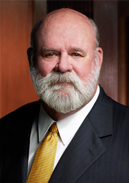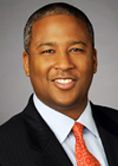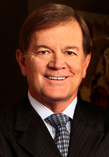Throughout his 49-year career, Frank Branson has scores of trial wins under his belt. But he says he has no plans to quit trying cases anytime soon.
“As long as I enjoy it, as long as I can do some good,” Branson told The Texas Lawbook. “That’s the nice thing about trying cases with your wife. If I get to where I’m not doing any good, I don’t think she would have any trouble telling me.”
Branson’s next big trial starts Tuesday in Dallas District Judge Dale Tillery’s courtroom, where he will take on Toyota Motor Corp. in a products liability case.

The three-week trial will pit 73-year-old Branson and his well-known plaintiffs’ firm against Barnes & Thornburg partner Victor Vital, who Toyota brought on board two months ago. It will be the lawyers’ first time to try a case against each other.
Legal experts who know both lawyers say it will be one hell of a show.
“[Frank] is just truly a force of nature,” said Randy Johnston of Johnston Tobey Baruch. “He is 100 percent authentic. He doesn’t try to be something that he’s not. If he’s got a weakness in his case, he doesn’t say it doesn’t exist when people are looking right at it. He’ll say, ‘Yeah it exists, but this is why it’s not important.’ As a result, jurors love him, because he doesn’t lie to them.

“Victor is an extremely good lawyer,” Johnston continued. “My prediction is Victor will be better dressed because the guy is one of the snappiest dressers I’ve ever seen. Victor is smart enough that he knows not to take Frank for granted, and he won’t. It is two great trial lawyers, neither of whom are prone to histrionics and bullshit. You could learn a lot by watching this trial.”
Aside from the courtroom dramatics, the case also has a “new kid on the block” appeal to it. It is Toyota’s first major civil trial in Dallas since the Japanese automaker moved its U.S. headquarters to Plano last year.
The case involves Benjamin and Kristi Reavis, who sued Toyota in November 2016 alleging their children sustained permanent brain injuries after a rear-end collision on U.S. Highway 75 near downtown Dallas. The couple alleges that the collision caused the front seats of the family’s Lexus to collapse into the back seats, where the children were.
The Reavises’ legal team, which also includes Chip Brooker and Eric Stahl, are expected to argue at trial that Toyota has a history of covering up safety defects in their cars to the public and the government.
Branson said once he learned the facts, it was a no-brainer to take the case.
“[The Reavises are] such great people and the injuries are so devastating,” Branson said of his clients. “And the liability, we think, is good. This corporation makes more money than the U.S. Mint does; and for them to put these kids’ lives at risk is just not acceptable. I don’t think the jury will find it either.”
In an e-mail, Toyota spokesman Eric Booth said the automaker is committed to providing its customers with safe and reliable transportation and that the company sympathizes with anyone in an accident involving a Toyota vehicle.
“When faced with product liability claims, regardless of where the claims are brought, we work to address the disputes in good faith. We stand behind the safety and quality of our vehicles and will defend our products vigorously.”

“I think it’s kind of telling they brought-on Victor,” said Toles, a partner at Fee, Smith, Sharp & Vitullo. “He’s definitely got an exceptional reputation at the courthouse, he’s a good lawyer. And the fact that they brought him on pretty late – I think that says a lot. Victor is very charismatic, and I think he has the ability to relate to people. He’s friendly, but he’s very thorough. He has a great courtroom presence.”
Branson is expected to lead juror questioning during voir dire Tuesday, while Brooker is likely to handle opening statements for the plaintiffs. Branson’s wife, Debbie Dudley Branson, is the plaintiffs’ jury consultant.
From murder trials to multimillion-dollar personal injury verdicts
Named one of The Texas Lawbook’s “Lions of the Texas Bar” in 2015, Branson has tried more than 100 cases to a verdict in his career. The Lawbook estimates that the combined jury verdict and settlements achieved by Branson for his clients approach $1 billion.
Though now known for his work representing ordinary people who have been horribly injured and business leaders in high-stakes commercial disputes, he kicked off his career representing a capital murder defendant.
Over breakfast last week, Branson said his first jury trial was in 1970 in Fort Worth. Branson’s client dated a woman whose sister’s boyfriend turned out to be a homicidal maniac. After attending an engagement party, Branson’s client ended up passed-out in the back of the other man’s car. The sister’s boyfriend woke up Branson’s client and convinced him to steal $12 from the son of a well-to-do Fort Worth family, a gas station attendant working his way through college after refusing to take money from his parents.
They stabbed the victim 37 times. The state sought the death penalty against both men. The morning of trial, the co-defendant pleaded guilty to nine life sentences to be served consecutively.
“This older lawyer’s face was about the color of that sheet of paper when I arrived,” Branson said of the senior lawyer for the defense, pointing to a white sheet of paper. “And he said, ‘Son, time to learn how to try a lawsuit.’”
“I ended up putting on most of the witnesses and arguing the case,” Branson says. “I do not recommend trial-by-fire for your first trial, especially if it is a capital murder case.”
Branson’s defense was simple: His client stabbed the woman under physical threat from the co-defendant. And he picked away at the prosecution’s case whenever he could.
“I got the medical examiner to admit on the witness stand that the victim was stabbed at a right angle,” Branson says. “My client was left-handed. It wasn’t much of a defense, but it was all we had.”
The jury deliberated for more than two days before issuing a compromise verdict: his client was found guilty, but received life in prison, not death.
One of his first big personal injury wins came in a Tyler federal court. In 1982, he represented the victims of a truck crash. The driver initially told police he dropped a cigarette, which caused him to collide with the van carrying Branson’s clients.
But on the witness stand, in a Perry Mason-like moment, the truck driver broke down when Branson was cross-examining him, confessing dramatically that the company made him drive even when he was tired.
The truck driver’s lawyer refused to even entertain a $2 million settlement proposal by Branson. The jury awarded Branson’s client $5.6 million.
Recent wins by Branson include a nearly $11 million verdict to the families of two victims who died in a charter bus crash while on the way to the Choctaw Casino and a $43 million verdict in West Texas for a group of investors who the jury found were wrongfully cut out of a lucrative mineral rights leasing deal.
Branson said his biggest achievement was convincing the daughter of an Arkansas Supreme Court justice to marry him.
“Besides being the love of my life, Debbie is my best friend, the mother of my children and the best lawyer and jury consultant I’ve ever worked with,” Branson told The Texas Lawbook a few years ago. “She keeps me focused on what’s important.”
Branson said during trial, he works on the case every night until about 10 p.m., then wakes up at 5 or 6 a.m.
“You just recognize going in that prior to trial and during trial, the days are long and you have to be on your toes,” Branson said. “The key to winning is preparation. It was Jefferson who said, ‘The harder I work, the luckier I get.’
“And, it helps if you’ve tried a lot of lawsuits,” Branson added. “There are enough things to worry about in a courtroom when you have an idea of what’s going to happen next. When you’re a young lawyer and you’ve got to worry about things you don’t know popping up as well as getting things done, it’s a lot more difficult.”
Johnston tipped his hat to Branson’s ability to keep winning trials.

“He continues to try lawsuits and win because he has found a winning formula,” Johnston said. “No. 1: He doesn’t take bad cases, and number two: he has support staff to do the stuff that he doesn’t want to do.
“Part of what amazes me is his energy level,” he added. “You spend eight hours a day knowing there’s someone ready to jerk your pants down in front of the jury if you make the slightest mistake, and the kind of concentration and energy it takes to do that is significant. Frank has found a way to continue to have that level of energy which a lot of people wouldn’t at his age.
“One of the best post-law school graduate courses you could ever have is trying a case against Frank Branson,” Johnston said. “You’ll learn a lot going against him.”
